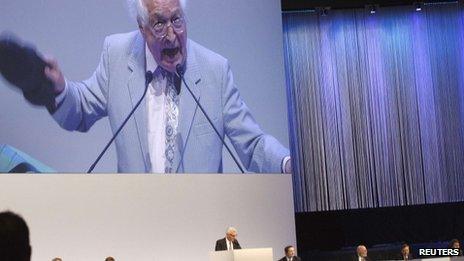Shareholder revolts gather steam
- Published

A shareholder holds up his shoe in anger at the annual meeting of Swiss bank Credit Suisse in April
The revolt against excessive pay has been gathering pace over the past month, with shareholders delivering humiliating "no" votes to a number of chief executives.
Citigroup got roasted by its investors. Aviva in the UK got the thumbs down on Thursday and companies like Barclays, Reckitt Benckiser and UBS have all been given nasty shocks.
The accepted explanation for this behaviour is that shareholders have been faced with declining returns and watched in increasing frustration as boardroom pay has gone ever upwards until, finally, they've lost their collective rags.
There is even some evidence to suppose this insubordination might be catching.
Huge pay increases
However the bigger question is why this didn't happen a long time ago.
While investors may well get upset in times of a crisis when they see their management walking away with big bonuses, they seem to have been remarkably insouciant when times were good, even though they were still seeing salaries outstrip their own returns. Why did they do nothing then?
The fact that they did so little suggests that when some kind of growth returns shareholders will return to their old negligent ways.
For illustration, you only have to look back at the first part of the last decade when shareholders could have expected to make handsome returns - if one regarded the rises in salaries of their chief executives as an indicator of their investments' growth and profitability.
According to the US-based Economic Policy Institute, pay for the average chief executive of a company making more than $1bn in revenue in the US rose 84% to $6.05m on an inflation-adjusted basis between 2000 and 2005.
The S&P 500 index in that time rose, er, minus 17%.
Comparing return on an investment with the growth in an annual salary is strictly speaking not a valid comparison - even so there is an obvious disparity here.
Rewarded for failure?
The greatest annoyance was over severance pay which displayed the most blatant mismatch of performance and reward.
For instance, Pfizer's former chief executive Henry A McKinnell was forced into early retirement after the company's stock price fell, but still managed to leave with an astonishing golden parachute worth more than $180m.
Mattel boss Jill Barad received $50m in severance pay after a disastrous internet investment at the peak of the tech bubble, which saw Mattel's stock price fall by 50%, wiping out $2.5bn in shareholder value.
Much of the rise in corporate remuneration comes in stock options, which are meant to reflect the performance of the chief executive - which they did, up to a point.
Often they can increase in value simply because the whole market is rising. That is becoming increasingly apparent as chief executives exercise options for huge numbers of shares granted them at the bottom of the market in 2008/9.
Will the law change?
But there have been slow - some would say painfully slow - attempts at reform such as bringing in shareholder votes on executive pay in the UK.
In the US, shareholders won the right to vote on executive pay at most public companies under the 2010 Dodd-Frank Act.
These are non-binding but as they start to be exercised more forcefully may start to impose greater restraint on board room pay.
Indeed the Citgroup vote was followed up by a shareholder suing the bank accusing directors of breaching their fiduciary duties by awarding more than $54m of compensation in 2011 to the executives, though the bank's performance did not necessarily justify it.
They may well stiffened by increased legislation.
The UK's Business Secretary Vince Cable is suggesting that shareholder votes might become binding and also that boards may have to have 75% approval to get their pay packages approved.
And then there is the case of individual shareholder activism, which rather than being constrained to fund managers, could start working all the way down the ownership chain.
Louise Rouse, of the UK's FairPensions campaign group, explains: "What we have been seeing over the last decade instead of a redistribution of resources to shareholders in the form of dividends is money going to excessive executive pay.
"So we want to see ordinary individuals holding the pension funds and the institutional investors to account asking them directly how they vote on pay packages.
"That sort of scrutiny would lead to greater action on their part."